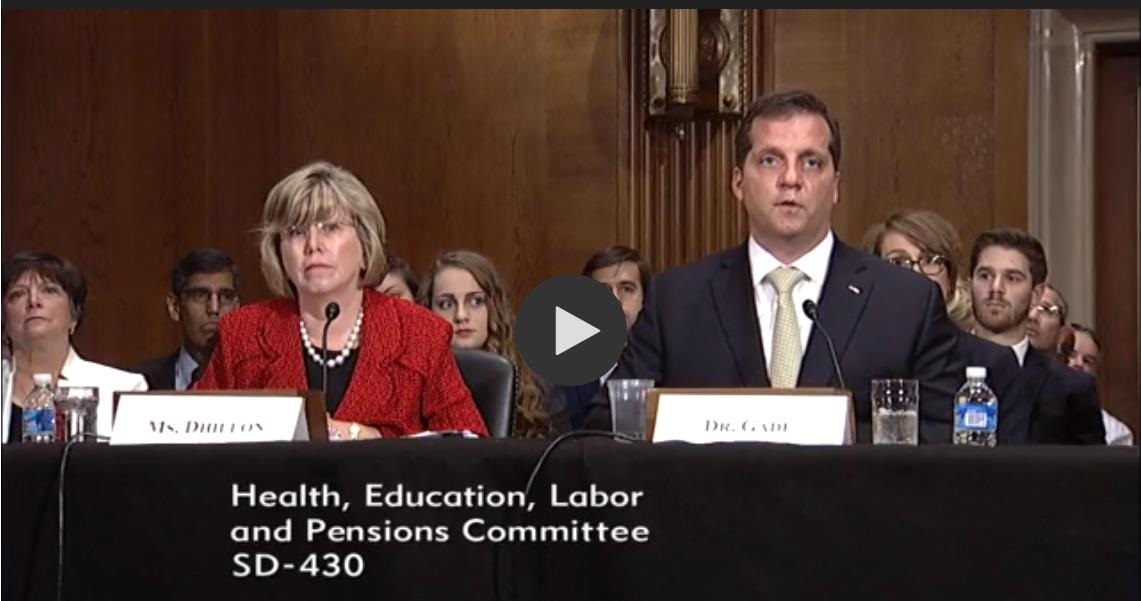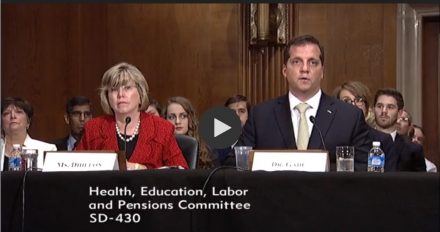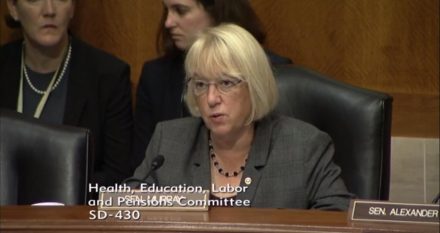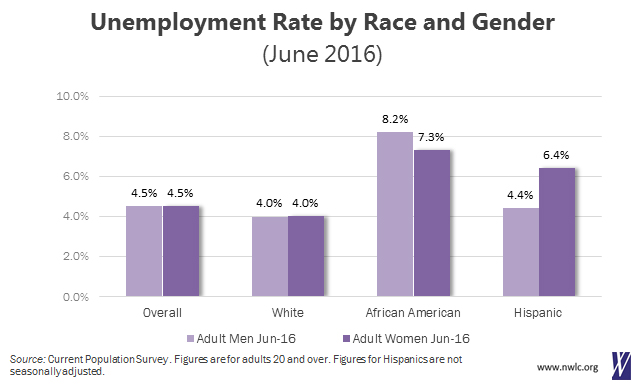Abortion rights, women of color, and LGBTQIA+ people are under attack. Pledge to join us in fighting for gender justice.
EEOC Nominees Can’t Play the Waiting Game With Civil Rights

On Tuesday, the Senate HELP Committee held a confirmation hearing for two Trump Administration nominees to the Equal Employment Opportunity Commission (EEOC), Janet Dhillon for Chair, and Daniel Gade for Commissioner. The EEOC is one of the country’s most important agencies for protecting and enforcing workplace civil rights protections, which are under attack by the Trump Administration.

Instead of holding separate hearings for each, the committee combined their hearings with that of another important and controversial executive branch nominee, in what is becoming a disturbingly common practice in this Congress. The result was that only half of the time at the two-hour hearing was devoted to questioning Dhillon and Gade, giving senators little opportunity to carefully probe their records and views on critical and timely employment discrimination issues, like transparency initiatives to address pay discrimination, and whether federal civil rights law prohibits discrimination based sexual orientation and gender identity.
Dhillon’s and Gade’s refusal to provide details or commitments on these and other civil rights issues gives us serious concern about their fitness for the positions to which they have been nominated, and the future of civil rights enforcement efforts at the EEOC.
No Commitment to Prioritize Progress on the EEOC’s Equal Pay Data Collection
This is a critical time in the fight for equal pay. Last month, the Trump Administration blocked an important Obama era-initiative to shine a light on gender and racial wage gaps, which stubbornly persist and have remained virtually unchanged for nearly 10 years. The EEO-1 equal pay data collection would have allowed the EEOC to confidentially collect pay data by race, gender, and occupational category from large employers. But the Office of Management and Budget (OMB) issued a “review and stay” of the pay data collection in a terse one-and-a-half page memo to EEOC, claiming it was too burdensome for businesses — before any employer had even submitted any data. Now it’s up to the EEOC to figure out a path forward on the equal pay data collection, and it’s no coincidence that Trump is trying to install two new commissioners at the same time.

Given the Trump Administration’s recent action, it’s notable that under questioning by Senator Murray at the hearing, both his nominees expressed support for the collection of pay data from employers by the EEOC. That’s a significant step forward.
But the devil is in the details. Since OMB failed to provide EEOC with any timeline for action, or guidance for next steps, it would be very easy for Dhillon as the new Chair, and Gade as the new commissioner, to indefinitely delay the process for revisiting and restarting the pay data collection. That’s why Dhillon must pledge to develop a transparent process to respond to OMB’s purported concerns and move the equal pay data collection forward, including a public hearing and other efforts to engage and solicit input from diverse groups of stakeholders (not just corporate interest groups). There must be a detailed timeline for implementing the process and submitting a revised proposal to OMB for review and approval in a timely manner. Six months should be more than enough time for this.
Process and timing matters, because the equal pay data collection was adopted after an extensive and transparent process over several years, including a public hearing, two rounds of notice and public comment, and detailed documentation by the EEOC of its analysis supporting the pay data collection, published in the Federal Register. In contrast, OMB’s decision to review and stay the pay data collection was made with no notice and no opportunity for public input. OMB’s brief memo provides no explanation or justification for its decision. That’s why we just filed a Freedom of Information Act (FOIA) request to force the Trump Administration to tell us who they met with and what information they relied on in deciding to stop the pay data collection.
And it’s concerning that we still don’t know Dhillon and Gade’s views on what the revised pay data collection should look like. Do they agree that it must include employer collection and submission to EEOC of important data that identifies job type, total compensation, and hours worked? Do they support the collection of pay data through some version of the EEO-1, or another mechanism entirely? Will employees have access to the data submitted by employers, so that they can uncover pay discrimination? These crucial questions weren’t answered at the confirmation hearing.
Refusal to Commit to Maintaining the EEOC’s Position That Title VII Protects LGBTQ Employees
The EEOC, which is tasked with interpreting and enforcing Title VII, takes the position that discrimination on the basis of sexual orientation or gender identity is prohibited sex discrimination under Title VII, and has continued to advocate this position in court, even in this Administration. But the idea that sexual orientation discrimination is a form of sex discrimination is under attack by the White House and the Department of Justice. The Second Circuit Court of Appeals is considering whether “sex discrimination” includes sexual orientation discrimination in a pending case in which the EEOC and Department of Justice filed separate briefs taking opposing positions. (And now the Supreme Court has been asked to grant review of another case considering the same issue.) And we might see the same dynamic going forward in cases that challenge gender identity discrimination as a form of sex discrimination.
Dhillon and Gade were asked repeatedly at the confirmation hearing if they would commit to maintaining the EEOC’s current position that Title VII protects LGBT people from employment discrimination. Worryingly, they both refused to do so. Both Dhillon and Gade claimed that since the law was “in flux” due to pending cases and a division between federal civil rights agencies, they want to take a “wait and see” approach, believing Congress and the courts should decide the issue.
But it’s the EEOC’s job to interpret Title VII to promote equal employment opportunity, to investigate incoming charges of discrimination, and to advocate for its legal positions in the courts. What does their response tell us? At best, Dhillon and Gade don’t understand the role of the EEOC or the responsibilities of the jobs they are nominated to fill. At worst, they don’t believe LGBTQ people should be protected from workplace discrimination by federal civil rights law and are willing to sanction employer discrimination by sitting on their hands. As Senator Baldwin pointed out at the hearing, waiting for Congress or the courts to decide this issue means thousands of pending discrimination claims won’t get addressed by the EEOC, and justice delayed is justice denied. LGBTQ people, whose livelihoods – and lives – are at stake, simply can’t afford to “wait and see.”
The lack of clarity on these crucial questions raises serious concerns about their qualifications to serve in these vitally important positions.




